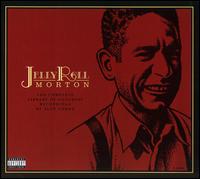
Ferdinand Joseph LaMothe, known professionally as Jelly Roll Morton, was an American ragtime and jazz pianist, bandleader, and composer. Morton was jazz's first arranger, proving that a genre rooted in improvisation could retain its essential characteristics when notated. His composition "Jelly Roll Blues", published in 1915, was one of the first published jazz compositions. He also claimed to have invented the genre.

Alan Lomax was an American ethnomusicologist, best known for his numerous field recordings of folk music of the 20th century. He was also a musician himself, as well as a folklorist, archivist, writer, scholar, political activist, oral historian, and film-maker. Lomax produced recordings, concerts, and radio shows in the US and in England, which played an important role in preserving folk music traditions in both countries, and helped start both the American and British folk revivals of the 1940s, 1950s, and early 1960s. He collected material first with his father, folklorist and collector John Lomax, and later alone and with others, Lomax recorded thousands of songs and interviews for the Archive of American Folk Song, of which he was the director, at the Library of Congress on aluminum and acetate discs.

Circle Records is a jazz record label founded in 1946 by Rudi Blesh and Harriet Janis.
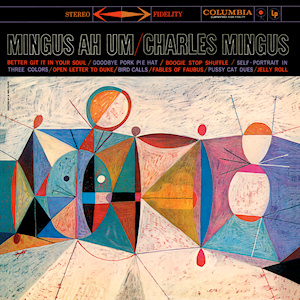
Mingus Ah Um is a studio album by American jazz musician Charles Mingus which was released in October 1959 by Columbia Records. It was his first album recorded for Columbia. The cover features a painting by S. Neil Fujita. The title is a corruption of an imaginary Latin declension. It is common for Latin students to memorize Latin adjectives by first saying the masculine nominative, then the feminine nominative, and finally the neuter nominative singular —implying a transformation of his name, Mingus, Minga, Mingum. The album was inducted into the Grammy Hall of Fame in 2013.
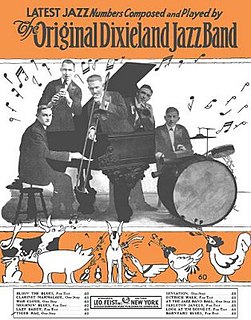
"Tiger Rag" is a jazz standard that was recorded and copyrighted by the Original Dixieland Jass Band in 1917. It is one of the most recorded jazz compositions. In 2003, the 1918 recording of "Tiger Rag" was entered into the U.S. Library of Congress National Recording Registry.

The Spanish tinge is an Afro-Latin rhythmic touch that spices up the more conventional 4
4 rhythms commonly used in jazz and pop music. The phrase is a quotation from Jelly Roll Morton. In his Library of Congress recordings, after referencing the influence of his own French Creole culture in his music, he noted the Spanish presence:
Then we had Spanish people there. I heard a lot of Spanish tunes. I tried to play them in correct tempo, but I personally didn't believe they were perfected in the tempos. Now take the habanera "La Paloma", which I transformed in New Orleans style. You leave the left hand just the same. The difference comes in the right hand – in the syncopation, which gives it an entirely different color that really changes the color from red to blue. Now in one of my earliest tunes, "New Orleans Blues", you can notice the Spanish tinge. In fact, if you can't manage to put tinges of Spanish in your tunes, you will never be able to get the right seasoning, I call it, for jazz.
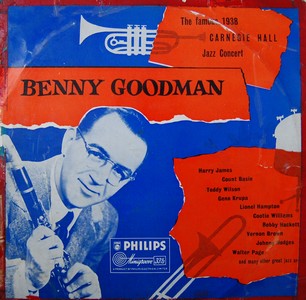
The Famous 1938 Carnegie Hall Jazz Concert by Benny Goodman, Columbia Records catalogue item SL-160, is a two-disc LP of swing and jazz music recorded at Carnegie Hall in New York City on January 16, 1938. First issued in 1950, the landmark recording captured the premiere performance given by a big band in the famed concert venue. The event has been described as "the single most important jazz or popular music concert in history: jazz's 'coming out' party to the world of 'respectable' music."
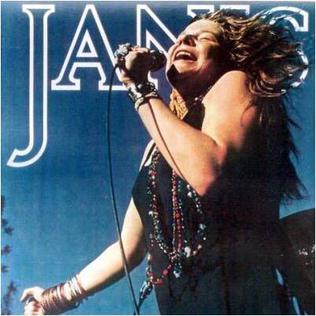
Janis is a collection of performances by Janis Joplin, issued in 1975 as a compilation album containing film soundtrack and live recordings. Disc one is subtitled "From the soundtrack of the motion picture Janis ". In addition to concert recordings from Toronto and Frankfurt, there are several short TV-interviews. Disc two contains recordings from Austin, Texas, plus four recordings from San Francisco (1965). The album booklet contains a photo documentary, with 22 pictures from Janis Joplin's life and career.
"See See Rider", also known as "C.C. Rider", "See See Rider Blues" or "Easy Rider", is a popular American 12-bar blues song that became a standard in several genres. Gertrude "Ma" Rainey was the first to record it on October 16, 1924, at Paramount Records in New York. The song uses mostly traditional blues lyrics to tell the story of an unfaithful lover, commonly called an "easy rider": "See see rider, see what you have done", making a play on the word "see" and the sound of "easy".
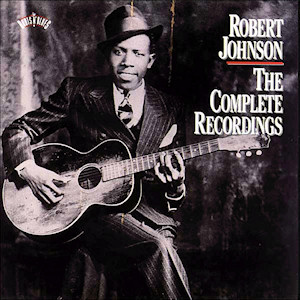
The Complete Recordings is a compilation album by American Delta blues musician Robert Johnson. The 41 songs were recorded in two sessions in Dallas and San Antonio, Texas for the American Record Company (ARC) during 1936 and 1937. Most were first released on 78 rpm records in 1937. The Complete Recordings, released August 28, 1990, by Columbia Records, contains every recording Johnson is known to have made, with the exception of an alternate take of "Travelling Riverside Blues".
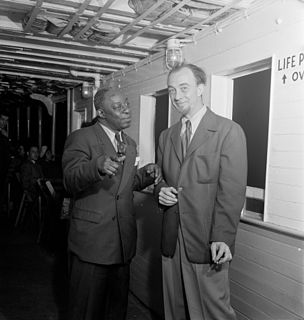
Rudolph Pickett Blesh was an American jazz critic and enthusiast.
"I'm Alabama Bound" is a ragtime melody composed by Robert Hoffman in 1909. Hoffman dedicated it to an M. T. Scarlata. The cover of its first edition, published by Robert Ebberman, New Orleans, 1909, advertises the music as "Also Known As The Alabama Blues" which has led some to suspect it of being one of the first blues songs. However, as written, it is an up-tempo rag with no associated lyrics. The song has been recorded numerous times in different styles—both written and in sound recordings—with a number of different sets of lyrics.

The Tatum Group Masterpieces, Volume Eight is an album by pianist Art Tatum and tenor saxophonist Ben Webster, with Red Callender on double bass and Bill Douglass on drums. The 1956 session was originally released in 1958 on Verve Records album produced by Norman Granz as The Art Tatum - Ben Webster Quartet, but Granz re-acquired the masters in the 1970s after the album was allowed to go out of print. He reissued the material as one of a series of eight Group Masterpieces featuring Tatum in collaboration with other artists, also issuing it as part of a boxed set, The Complete Pablo Group Masterpieces. The album has been reissued on CD, including a January 31, 1992 version with bonus tracks.

Air Lore is an album by the improvisational trio Air featuring Henry Threadgill, Steve McCall, and Fred Hopkins performing compositions by Jelly Roll Morton and Scott Joplin. It was reissued on compact disc by Bluebird/RCA in 1987 and included in the eight-CD box set, Complete Novus and Columbia Recordings of Henry Threadgill and Air on Mosaic Records.
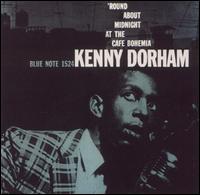
'Round About Midnight at the Cafe Bohemia is a live album by American jazz trumpeter Kenny Dorham. The album was recorded in 1956 at the Café Bohemia and released in 1957 on the Blue Note label. The original release featured 6 tracks; another 11 tracks, including some alternate takes was released in 1984 on the Japanese Blue Note label, as BNJ 61003/61004. A complete edition was released as a double-CD set in 2002.

John F. Szwed is the John M. Musser Professor Emeritus of Anthropology, African American Studies and Film Studies at Yale University and an Adjunct Senior Research Scholar in the Center for Jazz Studies at Columbia University, where he previously served as the Center's Director and Professor of Music and Jazz Studies. Szwed is the author of many books on jazz and American music, including studies of Sun Ra, Miles Davis, Jelly Roll Morton, Alan Lomax and Billie Holiday.
Anna Lomax Wood is an anthropologist, ethnomusicologist and public folklorist. She is the president of the Association for Cultural Equity (ACE), established in 1985 by her father, musicologist Alan Lomax, at Hunter College, CUNY.

Jazz Man Records was an American record company and independent record label devoted to traditional New Orleans-style jazz. David Stuart (né David Ashford Stuart; 1910–1984) founded the label in 1941 and sold it to Marili Morden and Nesuhi Ertegun. The label and its namesake – Jazz Man Record Shop, in Hollywood – were in the vanguard of an international revival of traditional jazz in the 1940s.
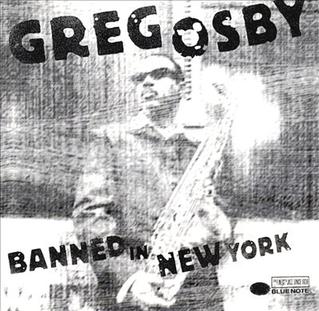
Banned in New York is a live album by saxophonist Greg Osby recorded at Sweet Basil in New York City in 1997 for the Blue Note label. The album was recorded by Osby on a MiniDisc recorder placed on a table in front of the band.

The Complete Plantation Recordings, subtitled The Historic 1941-42 Library of Congress Field Recordings, is a compilation album of the blues musician Muddy Waters' first recordings collected by Alan Lomax for the Library of Congress in 1941-42 and released by the Chess label in 1993. Lomax recorded Waters at Stovall Farm in Clarksdale, Mississippi in 1941 and returned the following year to make additional recordings. Thirteen tracks were originally released as Down on Stovall’s Plantation in 1966 on Testament Records.
